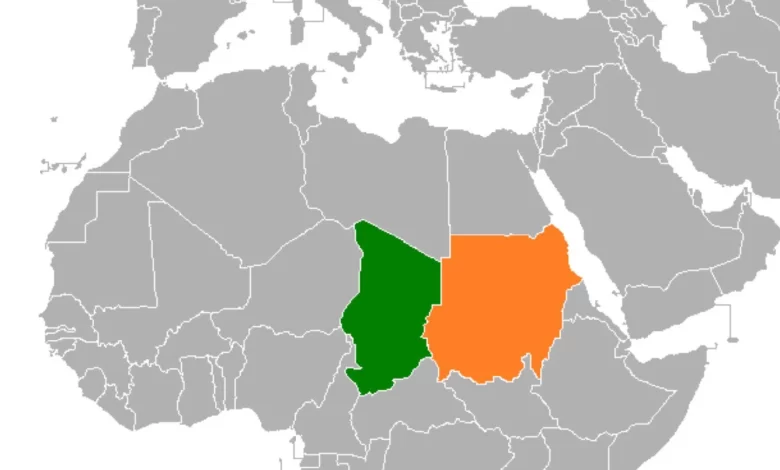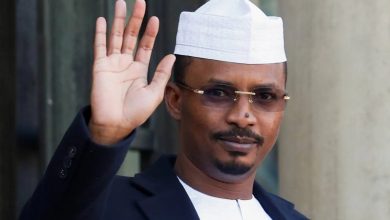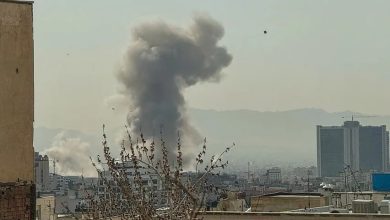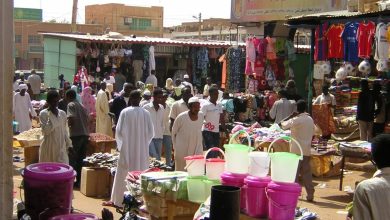Sudan War: Chad Falls into Its Trap

Sudan Events – Agencies
The war in Sudan is witnessing new developments, with the Sudanese Armed Forces (SAF) regaining territories nearly two years into the conflict at the expense of General Hemedti’s paramilitary forces. Chadian President Mahamat Déby is seen as having supported Hemedti, facilitating the establishment of a rear base for his forces on Chadian soil.
The conflict in Sudan is highly complex, involving multiple armed groups fighting for different purposes, intertwined with ethnic and social ties to border communities, as well as interventions from neighboring states and local authorities. Since April 15, 2023, the war has intensified between two camps: the Sudanese Armed Forces, led by General Abdel Fattah al-Burhan, enjoying legitimate support from Egypt, Turkey, Russia, and Iran; and on the other side, the Rapid Support Forces (RSF), led by General Hemedti, backed by the UAE, Chad, Libyan warlord Khalifa Haftar, and the Central African Republic.
In recent weeks, the Sudanese Armed Forces have gained the upper hand, making territorial advances almost daily. They have managed to reclaim northern Khartoum and have advanced toward fully liberating the capital. Additionally, they have regained parts of North Kordofan, positioning themselves for further incursions into South Darfur. The war’s outcome is expected to be decided in Darfur’s five states, which remain largely lawless except for the capital, El Fasher.
According to sources in Darfur, Hemedti might attempt to divide the country if he secures victory. However, analysts argue, “This will not happen. The RSF-controlled territories in Darfur are unsustainable, and they lack the capability to hold their ground.” The RSF, already besieged in the north and south of the region, lacks a strong logistical base and aerial support despite having combat forces.
As Sudanese forces advance, N’Djamena’s position weakens. To understand this dynamic, one must look at the war’s beginnings. When the conflict erupted, Chadian President Mahamat Déby initially pledged neutrality. However, his support for Hemedti soon became evident. This backing is unusual given that the RSF is historically linked to the infamous Janjaweed militias, accused of committing atrocities against the Fur, Masalit, and Zaghawa communities in both Sudan and Chad during the Second Darfur War in 2003.
Déby’s alliance with Hemedti has deepened divisions within Chad’s military establishment. Some families that fled Sudan to Chad in 2003 now hold key positions in the Chadian army or the Republican Guard. Additionally, some Chadian soldiers have defected to fight alongside the Sudanese Armed Forces against their former Janjaweed adversaries. This support for the RSF has also created societal divisions, exemplified by the case of opposition figure Yaya Dillo, who met Burhan’s envoys in Port Sudan in early 2024 before being killed by the Chadian military upon his return to N’Djamena. Today, his brother, Othman Dillo, is among the most prominent Chadians fighting alongside the Sudanese army in El Fasher.
Why Did President Déby Align with Hemedti?
Given the risks involved, why did President Déby choose to support Hemedti? Several key factors contribute to this decision:
1. Family and Political Pressures: Déby is not from the influential Zaghawa tribe. His maternal lineage is from the Goran ethnic group, making him politically vulnerable and lacking broad support within his army and population.
2. Weak Political Alliances: Unlike his father, Idriss Déby, who had strong tribal and military alliances, Mahamat Déby lacks a solid power base, pushing him to seek support from militia leaders like Hemedti.
3. Financial Incentives from the UAE: One of the primary motivations for this alliance is securing Emirati funding and investment. The UAE has been increasingly financing military activities in Chad, turning the country into a staging ground for Sudanese militias and strengthening its regional influence.
4. Military Supplies: Chad has been receiving a steady influx of weapons and supplies from the UAE, including advanced military equipment. While this boosts Chad’s military capabilities, it also makes Déby dangerously dependent on foreign backers.
5. Regional Strategic Interests: Chad’s engagement with figures like Burhan indicates an effort to secure regional backing, though Sudan’s government does not appear keen on direct intervention in Chad.
6. Ongoing Security Threats: Chad has a history of rebel attacks on N’Djamena. The looming possibility of renewed conflict keeps the Chadian public in a state of uncertainty and fear.
Current Challenges
A Fractured Military: Chad’s army remains deeply divided and weak, making it vulnerable to well-supported Sudanese-backed rebel groups.
French Military Withdrawal: With French forces leaving Chad, Déby’s ability to combat internal threats is significantly diminished.
Turkey’s Limited Role: While Turkey maintains a military presence in Chad, its involvement is mostly limited to drone supplies rather than providing direct military support.
Conclusion
Amid these challenges, President Déby is playing a dangerous game by forging alliances with militia groups. While he seeks financial and military backing to consolidate his power, the risks of internal instability and escalating conflicts remain high. Chad urgently needs effective strategies to build a unified and resilient national front to navigate the region’s complex challenges.
(Translated from the French newspaper Evrice)



